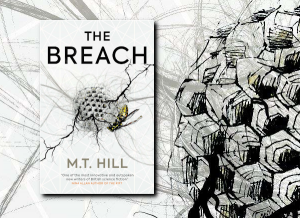THE BREACH by M. T. Hill (Book Review)
“This is the stuff you struggle to put in your reports. The smell. The taste. The way your body will make itself smaller until your back aches with tension. The marble of moulding fabrics. The colour of standing water. The alien heaviness of equipment left in corners under tarp, lost to the appetite of nature’s little helpers. Obsolescence and entropy twine and knot in these back pockets of little England. In them brick and vegetation fuse and grow together, form a kind of subterranean nervous system. Exploring is exhilarating because you never know how a changed environment will react to your presence. It scares you in some vital way, and you can never fail to be scared, because exploring is fear itself.”
“Start like I do. Ignore the map. Cross a boundary. And don’t get caught.”
 M. T. Hill’s The Breach is a powerful and disturbing exploration of the uncanny, a book that peels back the mundanity of life in 21st century Britain to prod at the weirdness hidden underneath. A thoroughly dislocating novel, The Breach exists in that interstitial space between genres, the mutant offspring of the Strugatsky brothers’ Roadside Picnic (1972), Jeff VanderMeer’s Southern Reach Trilogy (2014) and M. John Harrison’s work, particularly Climbers (1989) and the Kefahuchi Tract Trilogy (2002-2012). Like those works, The Breach has a fascination with the boundaries between the everyday rational world and the uncanny, and how once these boundaries are transgressed one can never be truly free of the consequences. The uncanny travels with you. Hill’s previous novel, Zero Bomb (2019), was a powerful and innovative work of science fiction, one of my top books of last year. The Breach sees Hill moving forwards rather than staying still. A difficult book to categorise and perhaps even more difficult to talk about, The Breach lays an intriguing trail into uncharted, post-New Weird territory. Like the novel’s protagonists, the reader emerges at the end unsure if they will ever be able to rationalise what they’ve just been through, but undeniably changed.
M. T. Hill’s The Breach is a powerful and disturbing exploration of the uncanny, a book that peels back the mundanity of life in 21st century Britain to prod at the weirdness hidden underneath. A thoroughly dislocating novel, The Breach exists in that interstitial space between genres, the mutant offspring of the Strugatsky brothers’ Roadside Picnic (1972), Jeff VanderMeer’s Southern Reach Trilogy (2014) and M. John Harrison’s work, particularly Climbers (1989) and the Kefahuchi Tract Trilogy (2002-2012). Like those works, The Breach has a fascination with the boundaries between the everyday rational world and the uncanny, and how once these boundaries are transgressed one can never be truly free of the consequences. The uncanny travels with you. Hill’s previous novel, Zero Bomb (2019), was a powerful and innovative work of science fiction, one of my top books of last year. The Breach sees Hill moving forwards rather than staying still. A difficult book to categorise and perhaps even more difficult to talk about, The Breach lays an intriguing trail into uncharted, post-New Weird territory. Like the novel’s protagonists, the reader emerges at the end unsure if they will ever be able to rationalise what they’ve just been through, but undeniably changed.
The Breach follows the story of Shep, a steeplejack who uncovers something secret and strange in a bunker during one of the urban exploration missions he goes on in his spare time, and Freya Medlock, a struggling local reporter who becomes embroiled in the consequences of Shep’s discovery whilst investigating the death of Stephen, one of his urban explorer friends. Shep is hired to work on an ambitious space elevator project funded by an eccentric billionaire, while Freya traces the increasingly unnerving implications of Stephen’s demise, however Shep brought something back from his expedition, and as he begins to unravel it becomes clear to Freya that time is rapidly running out.
The Breach’s approach to genre makes it very difficult to categorise. Even moreso than Hill’s previous works, it makes use of its near future north of England setting to anchor itself firmly in the mundane, even as Shep’s condition deteriorates and it becomes clear that he has become contaminated with something he picked up from the bunker, that his point of view is becoming increasingly alien. The children in the novel’s intriguing introduction section see the entities that ultimately infect Shep, Stephen and Freya as fairies, and so the novel engages with ideas around fairy abduction and changelings as much as alien abduction and X-Files-style conspiracy theories. Yet the novel refuses to resolve itself in a way that is easily fantastical or science fictional. Much of this is achieved by putting us squarely in the viewpoints of characters who do not understand what is going on, whose attempts to find meaning and resolution for the strange experiences they are going through is ultimately doomed to failure. As with M. John Harrison’s writing, the object here is not to provide one with easily digestible answers, but to engage with the world at its most unknowable and confounding, to embrace ambiguity and the impossibility of ever fully understanding the universe from a human perspective.
The novel largely takes place in specifically post-industrial settings. From the disused bunkers, boarded up buildings and rusted pylons that Shep and Stephen explore in their free time, to the construction rigs and power plants that Shep works on, this is a physical and psychic landscape indelibly scarred by humanity’s technological progress. Even the classic idyllic landscape of the Lakes is the location of Shep’s mysterious bunker, a site marked by human presence and by human lack of presence, as it has been abandoned to the elements and to the inexplicable entities that haunt our protagonists. Hill explores the working class milieu of the steeplejacks, the construction works and engineers who work specifically on structures high above the ground. This is a world that exists integral to the infrastructure of our modern lives, yet is alien to those of us who live and work on the ground. It allows Hill to give us a different perspective on the structures we see every day, one that is literally heightened and made speculative by the work on the space elevator.
The Breach is also an exploration and meditation on humanity’s sense of free will. The things that infect Shep use him in a way that is likened to how trees use animals via apples, they are simply a medium to incubate and propagate the next generation of apple trees. Similarly, all of Shep’s and Freya’s attempts to break out of the structures and routines of their daily lives, the expectations placed upon them by family, co-workers, friends, are in turn being manipulated by even more obscure forces that they are even more powerless against. Their attempts to outrun, hide and subvert these forces are thwarted because there are other agencies – government, special ops, whatever – involved behind the scenes, operating however many steps ahead of them. Thus however hard they try to regain some kind of agency for themselves, their attempts are always doomed. This is a potent metaphor for life under late period capitalism.
The novel is also notable for how the uncanny manifests in the personal. As Shep’s behaviour becomes even more erratic, as the infection takes hold, he becomes more and more disturbing to us. In order to portray this convincingly, you have to be a very adept observer and chronicler of normal human behaviour. You can see this in the works of M. John Harrison, where his characters frequently achieve a level of personal “off-ness” which is incredibly disturbing but difficult to put your finger on exactly why. Hill handles Shep’s descent into the uncanny masterfully, starting with subtle hints and then escalating as he gets stranger and stranger. This psychological journey mirrors his physical journey into the bunker, as he crosses an invisible boundary that there’s no real way back from. It is in this way that Hill really gets under the reader’s skin. The Breach is a powerful and unsettling novel in the best of ways, and I can’t wait to see what Hill does next.

